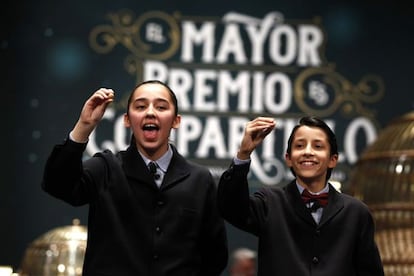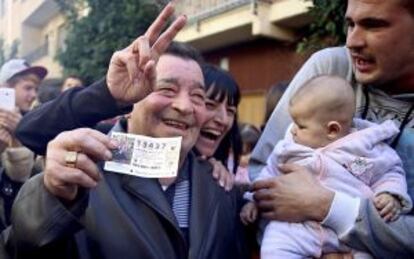What are your mathematical chances of winning Spain’s Christmas lottery?
Contrary to popular belief, there’s no point standing in line at La Manolita lottery seller

For generations, Christmas in Spain has been inextricably linked to a lottery known as El Gordo (literally, The Fat One) because of its large prizes.
For a few hours on the morning of December 22, millions of people throughout the country tune in to the radio or television to hear students from San Ildefonso school – a former orphanage – sing out the winning numbers. Images of winners uncorking champagne bottles and tearfully embracing one another get aired for days afterwards.
Some people believe that there are numbers at the end of the winning combination that are more likely to come up than others
In terms of brand recognition, few companies can compete with the Spanish Christmas lottery, which has been held since the early 19th century.
Besides paying out more than any of the other state lotteries organized throughout the year, the Gordo is picked according to a different mathematical formula.
All the other lotteries are chosen by selecting a number between zero and nine for each of the five digits in the winning ticket, one at a time.
But in the case of the Christmas lottery, the winning five-digit number is picked from 100,000 balls going round in circles inside a giant rotating drum. Yours is in there, as is your neighbor’s, and even that other number you meant to buy from your local bar. They’re all inside, between 00000 and 99999.

There is also a smaller wire basket containing 1,807 tiny wooden balls. These spheres show the prize money randomly assigned to each number that gets pulled out of the giant drum. One child pulls out and sings a number, and another child pulls out and sings its corresponding prize money.
It’s easier to understand if we calculate the possibility of winning a specific prize, let’s say, the top one. According to the French 18th-century mathematician Pierre-Simon Laplace, who is credited for developing some of the earliest probability theories, the chances of something happening is calculated by dividing the number of favorable cases by the number of possible outcomes.
How many favorable cases are there? One: El Gordo.
How many possible outcomes are there? 100,000, all the different numbers in the drum.
So the probability of somebody winning the Gordo on the basis of buying one ticket is 1/100000 = 0.00001, which seems reasonable enough, as it’s greater than the chance of winning the weekly lottery known as La Primitiva, but still very slight.
The chances of winning El Gordo are the same as winning the second prize, assuming the two outcomes are mutually exclusive. In other words, if you win El Gordo, you’re not going to win the second prize as well. The same applies to the third, the fourth, and the fifth, along with the rest of the prizes, one for each of the 1,807 balls that are pulled out from the small wire basket.
Besides these big awards, there are consolation prizes for tickets that “look like” the winning number – the ones that come right before and right after, the ones with the same final digit, etc. Some people will get their investment back. But let’s face it, nobody plays El Gordo to get their money back.

Some people believe that there are numbers at the end of the winning combination that are more likely than others to get picked, saying things such as “five is the last digit that comes up the most.”
For many people, this is proof that this number has a higher probability of being picked than others, but in fact it’s just proof that until now at least, it is more frequent. Similarly, we shouldn’t think the opposite, that it is unlikely the five will come up because “it’s already been picked several times.”
Games of chance do not “compensate.” Statistical regression toward the mean is not a causal phenomenon. As there are 10 possible endings to the five-figure winning combination, each digit has a 10-percent probability of occurring.
There is a widely held but mistaken belief, known as the gambler’s fallacy, which states that if something happens more frequently than normal during a given period, it will happen less frequently in the future; or that if something happens less frequently than normal for a while, it will happen more frequently in the future – presumably nature balancing things out. For example, if you are tossing a coin and heads has just come up 10 times in a row, then it’s best to bet on tails. Wrong. It is probably better to bet on heads because it sounds like the coin is weighted.
Besides these big awards, there are consolation prizes for tickets that "look like" the winning number
Others claim that some of the balls tumbling around in the drum weigh more than others due to the numbers etched on them, and are more likely to fall out into the cup. Wrong. They are etched using a laser, and each weighs exactly the same.
Similarly, there is no point standing in line for three hours outside La Manolita, the Madrid lottery seller reputed to have sold more winning tickets than any other. All numbers have the same probability of winning, and if some ticket sellers are associated with luck, that is just the result of good marketing, superstition, or tradition. Obviously, the outlets that sell the most tickets will, over time, have a better chance of producing winners.
Now let’s imagine that you have won El Gordo, worth €4 million. Will you actually receive €4 million? It depends on how much you spent on the ticket. A whole number costs €200, so if you bought a tenth of a ticket, or a décimo, which most people do, that’s worth a tenth of the €4 million. And if, like many people, you have simply bought a €1 stake in a décimo, then you calculate on the basis of €200 being the equivalent of €4 million, with a €1 stake giving you €20,000.
About Verne
Which does not sound like a bad investment. But (and there’s always a but), takings of over €2,500 are subject to 20 percent tax for anything over that amount. In other words, if you win El Gordo, €79,500 of the €400,000 will go to the taxman. So a winning décimo will bring you €320,500 after tax.
The Christmas lottery pays out around 70 percent of the value of all tickets sold. The remaining 30 percent goes to the lottery sellers and the state lottery organization, which falls under the remit of the Finance Ministry.
And it is always possible that the winning ticket, the big one, will not be sold, so that the €640 million set aside for that ticket won’t be shared out either, as happened in 1931.
So let’s hope you get lucky and win something, because we’re all getting a share of it anyway.
Tu suscripción se está usando en otro dispositivo
¿Quieres añadir otro usuario a tu suscripción?
Si continúas leyendo en este dispositivo, no se podrá leer en el otro.
FlechaTu suscripción se está usando en otro dispositivo y solo puedes acceder a EL PAÍS desde un dispositivo a la vez.
Si quieres compartir tu cuenta, cambia tu suscripción a la modalidad Premium, así podrás añadir otro usuario. Cada uno accederá con su propia cuenta de email, lo que os permitirá personalizar vuestra experiencia en EL PAÍS.
¿Tienes una suscripción de empresa? Accede aquí para contratar más cuentas.
En el caso de no saber quién está usando tu cuenta, te recomendamos cambiar tu contraseña aquí.
Si decides continuar compartiendo tu cuenta, este mensaje se mostrará en tu dispositivo y en el de la otra persona que está usando tu cuenta de forma indefinida, afectando a tu experiencia de lectura. Puedes consultar aquí los términos y condiciones de la suscripción digital.








































